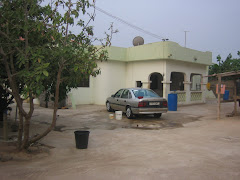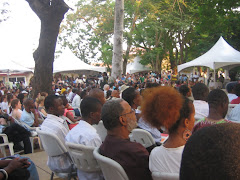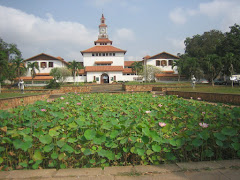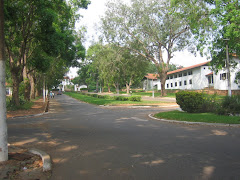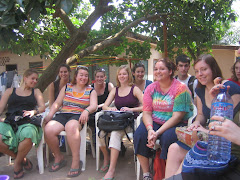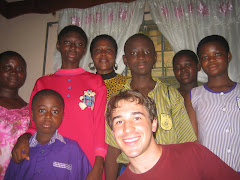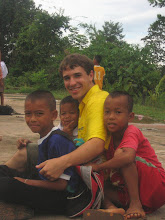Hey everyone,
I spent the last entries giving you a sense of the crazy stories and interesting things I've been up to, but this time I want to give you an idea of what it's like to live here day to day in Accra, Ghana. This entry is a combination of different stories, so this didn't all happen in one day, but it'll help you see what life is like.
I wake up, it's exactly 5:58am, somehow I've managed to wake up right before my alarm now as I wake up at 6am everyday. Every night I'm asleep by 10pm because that's when everyone else in the house goes to sleep. The luke-warm water of the bucket shower is a welcomed wake-up as I use my imported bar of soap to lather up. When finished, I head over to the table and slice myself two pieces of bread and prepare some miloh (Ghanaian hot chocolate). Now it's off to America House, about a 10 minute walk-I pass by my friend Abigail at the corner and greet her with "Ehti Sen" (how is it?). Upon arriving at America House, I realize the taxi to Legon isn't here yet, so I sit and wait. Getting to class is always variable because I take a shared taxi and it doesn't normally arrive until about 7:15 when I have a 7:30 class and it can take anywhere from 5 to 30 minutes to fill up with other passengers. I can never be sure of when I'll get to campus regardless of how early I leave. Thankfully, this morning it's here in time to get me to campus in time. I drop off by the front gate and wait for the train of goats to finish crossing my path. Up ahead I spot the newscorner, a spot of sidewalk where a man has set out the newspapers. Like more pedestrians, I hover over the papers reading the front page until the man comes over and says, "Are you going to buy that", then it's time to shake my head and leave.
I arrive in my POLI 306: Africa and the Global System class and sit next to my friend Rachel. Right on time, the lecture begins with todays topic being The Affect of Globalization on Africa. He begins, "Despite the affects...the affects of colonialism...Despite the affects of colonialism on Africa...", unfortunately, he is reading pages 24-26 of our reading word for word as the entire class copies it down. Somehow, my classmates don't make copies of the reading and so have no idea that he's reading word for word or that the past 4 weeks have been just chapter one of this book word for word. Nonetheless, the class perks up with questions every once in a while which are mainly, "Can you say that again", "How do you spell that word". Overall, it wasn't interesting as I just followed along in the book underlining the paragraphs he read verbatim. Many classes in the University proceed in this fashion of people copying down the lectures words without critical analysis or questions.
Nonetheless, it's only 9:30 and I have the whole day ahead of me. My mission for the afternoon is to find for myself a pair of decent quality sandals to use as I prepare to travel for 6 weeks by myself through West Africa (more about this later). I decide to head down to Makola Market in downtown Accra. Walking out of the university, I stand at the tro-tro station by campus waiting for a car to say "Accra, Accra, Tema Station". After nearly thirty minutes one arrives overpowering the calls of "Circ Circ Kaneshi Station". I push and chove my way onto the tro-tro competing with other people standing at the roadside for the rare tro-tro. On the way on board, I loose my flip-flop and have to push my way back to pick it up, and thankfully am still able to get on the tro-tro. Soon after getting on the tro-tro the mate turns around and collects 45 pesuas (approx 30 cents) from everyone on board. I'm stuck between two large ladies and the one on my left keeps asking me to move over so people can get behind her, but because of the size of the lady on my right I can't move anywhere. It's starting to get hot, so sitting in the middle away from the windows, I sweat up a storm that I continuously dry off with my shirt.
The tro-tro stops at Tema station and I alight. I walk through crowds of people and small stalls by the road selling everything from bags to Okra to snails. Finally I arrive at the market, which is essentially an endless maze of alleys with stands lining both sides selling food, imported goods, bags, Chinese shoes, Fufu pounding sticks, pots and dishes. I walk through the maze realizing that there's a slight pattern to each section and some areas have more shoes than others. I start walking down an alley with alot of sandals and stop at at least 4 tables to view the sandals. They're mostly poor quality, mainly held together by glue and nothing like the quality of Teva. I actually see two shoes labeled with Timberland and Teva, but they are obvious knock-offs illegally named. I'm left with a choice between Tita, Sport, or the aptly named "Made in China" sandal with no brand name. At the fifth stall I decide that I can't find a shoe that will last me 6 weeks so I buy a cheap Sport brand for about 5 cedi ($3.50). I am amazed to see how much of the Ghana population works in this informal sector. Given the few businesses I see, it's almost as if 70% of people in Accra are in the informal business of selling something.
On the way back to Tema Station I weave my way through the crowds to the hackles of Whiteman and Obruni. Some are a little more desperate and try everything, one man calls out "Hey Whiteman...Obruni...Second Jesus". Eventually I turn around laughing at the fact that he called me second Jesus, most likely because of my longer hair and the facial hair I've been growing. I eventually return to Tema Station and stop at a large cart of bootlegged movies. Ghana has a very active sales scene of Hollywood movies that are bootlegged. In fact my host brothers' favorite movies are Matrix and Batman, we just watched Batman this weekend for the second time in a month. Regardless, I am particularly admiring of the sets of Will Smith, Bruce Willis and Denzel Washington. For the cost of 6 cedis ($4), I got about 30 movies ranging from Will Smith's MIB, Enemy of the State, Independence Day to Willis's Die Hard series, Sixth Sense, and Lucky Number Slevin to Washington's Deja Vu, Training Day and Remember the Titans.
Attempting to find the America House car in the jungle of tro-tros I ask mates who directly with their fingers mainly telling me which way to walk. Directions in Ghana are mainly hand pointing, there's no street names, no turn left here and right here, just "go that way". When you do give directions it's more like "Take a right at the Adenta billboard, a left at the big red crate, and look for the house with the red gate". Finally, I find the America House car and take a sit. I'm surrounded by Ghana's business people that have stocked up at Makola for their own sales. Under my legs I have a set of unidentified boxes belonging to the person behind me and under the seat in front of me is an Army's ration of brown tubes called Bayere (yams). My feet are mainly immobile as I can't spread forward due to the yams or backward due to the boxes. As the car is filling, business people stop by the car selling Yogurt, Pure Water, flashlights, steering wheel covers, miracle drugs, and bible verse books. I've already bought my items for the day, so I don't need anything, but I do buy a pure water for about 3 cents. Everyone in the capital drinks water from small sachets that have 500ml that are 5 pesuas (about 3 cents). Finally the car fills up and we are ready to leave. As if wanting to break the wonderful silence, a baby in the back starts crying. Attempting to block out the annoying sound of the baby behind me, I stare out the window. I take note of the "Ghanaian bumper stickers"-essentially every tro-tro and taxi has put a phrase on the back window with some yellow stickers. Some of the more interesting have been "Clap nice for Jesus", "Cry your own cry", "Oh friend, why?". It's interesting to observe how open religion is in this country. Most tro-tros say something from the bible or praise Jesus, whenever I get on a bus going long distance a preacher stands up and blesses the bus before we go, for meetings at my internship we'd pray before beginning. Christianity is a definite part of life and involves itself in so many different ways.
Thankfully, this tro-tro doesn't have any problems getting home. In a different story, my tro-tro yesterday had broken down in traffic so the mate paid everyone back the money and we had to find a new ride. Of course we were on a corner with literally 100 other people waiting so it took nearly an hour to get a new ride and even then I had to push and chove to get on it. I get down at America House with most of the car an walk home. It's right around 6:00 so it's time for dinner. I knock on the front gate and my host sister Ama opens the door. I greet her in Twi "Maadwo, ehti sen?" and site down outside the house. Seeing Jen, I let her know that I'm here and ready to eat so she warms up my dinner. Tonight it's Banku and Okra Stew. The banku is a large ball of fermented Kassava and corn dough that is your silverware for the stew. I dip my hand into the banku, take a small piece with my hand, dip it into the stew and eat it below the stew slips out of my hands. It's a struggle at first, but eventually you master the technique.
After a tiring day, it's time to sit down for the big family activity: watching our favorite TV station VIASAT 1: Your Number One Entertainer. As is the case for every Monday through Friday the nightly lineup is Hanging with Mr. Cooper, Cosby Show, Friends, and then CSI. In between the shows, this station offers very few commercials and tend to spend more time advertising its own shows and movies. As a result, we know what movie is on at any day of the week because we've seen the commercial at least 5 times. Nonetheless, we get sick of the commercials advertising Oprah which is on at 5pm and the movies as a whole which is easily a 2 minute segment. By the beginning of CSI at 9pm, the family gradually peters out. Some members start heading to bed during the show and other hold out to the end. Typically it's me and my host mother and maybe my host sisters that last until the end of the show. Jen and Ama lock up the house around 10 and we all head to bed.
So in between the crazy stories that I've shared with you the past couple months, there are those little things that are interesting that happen everyday. I hope that this entry has helped you understand some interesting things about Ghana and what's it's like to live here.
All the best,
Ben
Tuesday, April 28, 2009
Tuesday, April 21, 2009
My weekend in Volta and other things
Dearest friends,
We arrived in Volta at about 10am after having been on the bus for about 3 hours. We arrived at a hotel and pulled up to the building which was marked with the name "The Brick House". Mr. Gyesi got off the bus only to come back a few minutes later to say, "Umm...the president of Ghana will be here in 30 minutes". About an hour later, 5 police motorcycles, 5 police cars, and 5 SUVs drove by in a procession. He drove through a gate marked on both sides by policemen and given the parade of reporters walking through we decided to do the same. We walked through the gate, Me, Billy, Dana, Talia, and Mary and stood up near the crowd. The cameras crowded around the man that emerged from the large black SUV wearing a hard hat. The president had come to the hotel because the manager was building a mall and the President decided it was a good stop on his encouraging development tour. So there I was, standing in this big crowd near the President of Ghana. We inched closer and closer and evenutally go within a foot of the President, close enough to shake his hand. However everything was recorded and we weren't respectfully dressed to shake his hand, so we didn't. The President finished his speech and walked over to the building site, looked the plans, and shook the hands of a large group of visitors from a church in Scotland & Germany that had arranged to meet him. Me and Tali rushed to the end of the line to try and get a handshake as he went around, but we were just a couple seconds too late. Nonetheless, I was within a foot of the President of Ghana and that was pretty dam cool!
Later that afternoon we traveled down to Wli falls, the tallest waterfall in West Africa. It stands at a height of nearly 200 feet and pounds onto the lagoon below with massive force. Almost our entire group walked into the water and bravely trekked through the waterfall. The next day we visited the Tofi Atome Monkey Sanctuary and I fed small monkeys bananas. We made loud kissing noises and the monkeys started coming from throughout the trees. As we held onto the bananas strongly, the monkeys would reach out from the trees and peel the bananas right from our hands!
At my internship, I've been spending the past couple of weeks evaluating the organization's Micro-credit program. I've traveled all over greater Accra meeting with GHAFUP groups to conduct group interviews about the successes and failures of the micro-loan program. The work has given me key insight into the challenges of grassroots development work. Microfinance is a very tricky business. Although it's not the key of People's Dialogue, it tends to be main reason for members joining the Federation. From what I could tell, repayment has been a significant problem for a number of reasons. The first is that many people use the loan to buy materials for their business (i.e. Fish mongers buy fish to smoke, store owners buy provisions) and use the income generated by the selling of these products for immediate needs. The primary needs are school fees, food, and emergencies (i.e. relative sick). After these immediate needs are met a small portion of the original loan is invested in the business so the impact of the loan significantly diminishes rather than increases over time. When there aren't complementary programs that alleviate the press of these immediate needs, this is a common occurrence. So after several months the impact of the loan is gone and they are left to repay it. In addition, some members of the Federation have joined primarily for the possibility of loans and will pay back the loan if they know a new one is coming. Some individuals have the capital to pay the loan back, but would rather use it for other things like feeding kids, if a new loan is not coming. Without a new loan coming there's no incentive to pay it back. Because PD is not an MFI, there isn't always money available to make loans for everyone who received a first loan, so repayment level is hurt. Nonetheless, there has been a significant impact of the loans on individuals as they're able to start businesses when they were doing nothing before, put their kids through education, provide for families as widows, and build there businesses from a table on the side of the street to a store. This is part of what I'll be putting into the evaluation I'm preparing for the office. I'd be glad to talk more about what I've learned, but most of it I don't want to put up online.
Overall, I've learned a great deal about grassroots community development work, mobilizing individuals for self-help, the difference between on the field and in the office work, and the potential of the poorest of the poor in Ghana to improve their lives.
All the best,
Ben
We arrived in Volta at about 10am after having been on the bus for about 3 hours. We arrived at a hotel and pulled up to the building which was marked with the name "The Brick House". Mr. Gyesi got off the bus only to come back a few minutes later to say, "Umm...the president of Ghana will be here in 30 minutes". About an hour later, 5 police motorcycles, 5 police cars, and 5 SUVs drove by in a procession. He drove through a gate marked on both sides by policemen and given the parade of reporters walking through we decided to do the same. We walked through the gate, Me, Billy, Dana, Talia, and Mary and stood up near the crowd. The cameras crowded around the man that emerged from the large black SUV wearing a hard hat. The president had come to the hotel because the manager was building a mall and the President decided it was a good stop on his encouraging development tour. So there I was, standing in this big crowd near the President of Ghana. We inched closer and closer and evenutally go within a foot of the President, close enough to shake his hand. However everything was recorded and we weren't respectfully dressed to shake his hand, so we didn't. The President finished his speech and walked over to the building site, looked the plans, and shook the hands of a large group of visitors from a church in Scotland & Germany that had arranged to meet him. Me and Tali rushed to the end of the line to try and get a handshake as he went around, but we were just a couple seconds too late. Nonetheless, I was within a foot of the President of Ghana and that was pretty dam cool!
Later that afternoon we traveled down to Wli falls, the tallest waterfall in West Africa. It stands at a height of nearly 200 feet and pounds onto the lagoon below with massive force. Almost our entire group walked into the water and bravely trekked through the waterfall. The next day we visited the Tofi Atome Monkey Sanctuary and I fed small monkeys bananas. We made loud kissing noises and the monkeys started coming from throughout the trees. As we held onto the bananas strongly, the monkeys would reach out from the trees and peel the bananas right from our hands!
At my internship, I've been spending the past couple of weeks evaluating the organization's Micro-credit program. I've traveled all over greater Accra meeting with GHAFUP groups to conduct group interviews about the successes and failures of the micro-loan program. The work has given me key insight into the challenges of grassroots development work. Microfinance is a very tricky business. Although it's not the key of People's Dialogue, it tends to be main reason for members joining the Federation. From what I could tell, repayment has been a significant problem for a number of reasons. The first is that many people use the loan to buy materials for their business (i.e. Fish mongers buy fish to smoke, store owners buy provisions) and use the income generated by the selling of these products for immediate needs. The primary needs are school fees, food, and emergencies (i.e. relative sick). After these immediate needs are met a small portion of the original loan is invested in the business so the impact of the loan significantly diminishes rather than increases over time. When there aren't complementary programs that alleviate the press of these immediate needs, this is a common occurrence. So after several months the impact of the loan is gone and they are left to repay it. In addition, some members of the Federation have joined primarily for the possibility of loans and will pay back the loan if they know a new one is coming. Some individuals have the capital to pay the loan back, but would rather use it for other things like feeding kids, if a new loan is not coming. Without a new loan coming there's no incentive to pay it back. Because PD is not an MFI, there isn't always money available to make loans for everyone who received a first loan, so repayment level is hurt. Nonetheless, there has been a significant impact of the loans on individuals as they're able to start businesses when they were doing nothing before, put their kids through education, provide for families as widows, and build there businesses from a table on the side of the street to a store. This is part of what I'll be putting into the evaluation I'm preparing for the office. I'd be glad to talk more about what I've learned, but most of it I don't want to put up online.
Overall, I've learned a great deal about grassroots community development work, mobilizing individuals for self-help, the difference between on the field and in the office work, and the potential of the poorest of the poor in Ghana to improve their lives.
All the best,
Ben
Saturday, April 11, 2009
Passover in Ghana
It was back-breaking lifting brick after brick carrying them towards the inside of the school. For about an hour we lifted 20 pound cement bricks and carried them into the insides of the 3 foot high walls of the school we were building. We were on a volunteer trip that morning to build the library and computer lab for a small school outside of Accra. The objections I have to the short-term mission trip mentality aside, it was an interesting way to begin the Passover day. We sweated in the hot sun, plastered mortar on the walls of the school, and lifted bricks onto the walls. Although we completely very little and the masons had to do much of the work, it was an ironic experience to be doing hard labor on the day before the passover seder. Although it was for a very different purpose and we surely won't building Pithom and Raamses, it was still a connecting experience to my Jewish history.
We returned to campus at around 2:00 and it was time to prepare for the seder. The weekend before Naomi and I had bought most of the ingredients including South African sweet wine, plates, forks, cups, etc. The Tuesday before the seder I had traveled all over America House getting ingredients to make the mail meal: Yams and Tomato Stew. That afternoon, me and Dave cut tomatoes and onions while our host sister prepared the yams and our host Mom combined the ingredients into a delicious stew. While we prepared the meal, Naomi and Abby were active on campus preparing the seder room. The seder took place in the 3rd floor TV room of the International Students Hostel, where the TV was broken so we didn't have to compete with the Liverpool-Chelsea Champions League game that was going on at the same time. Our seder table was two white tables put together with a white table cloth and comfortable chouches surrounding it. We had set up about 20 settings. On the table were our plastic cups of salt water, Elijah's cup (which was composed of the top-half of a water bottle wrapped in Kente cloth), a plate of Spinach (our green vegetable since Parsley was not available), Shitaw (a spicy Ghanaian spice that we used because we had no Horse Radish or Maror). Our seder plate used spinach, a raw egg, Shitaw, very delicious Charoset, and a smelly chicken bone that I saved from my dinner on that previous Sunday that we had to keep in it's own plastic bag because it smelled awful.
The seder was a cross-cultural sharing experience. We had about 20 people there including Esther and her parents who had come to Ghana for about a week. We had around 10 Jews total and the rest of the people were interested people from our program who wanted to experience a Jewish seder. The experience of leading a seder, for myself, was very unique. We began by explaining the items on the seder plate, dipped the very bitter spinach in the salt water to symbolize the tears of the Jewish slaves in Egypt (the spinach was bitter because it had accidentally frozen in the fridge and defrosted), retold the story of the Exodus through the children's Hagada as we passed it around the table. We joined in rousing songs of Dayenu which Naomi as part of her family tradition lead in Baptist retorhic and we all sang the chorus together. We ate our Matzah that Abby and I had amazingly managed to get through a Chabad group that was conducting seders with some Israeli companies in Accra. We ate our Matzah and Charoset sandwiches which was a favorite item for most people in the seder-the recipe I copied off the internet and the sweet wine we had got worked out excellent. We drank our cup of wine, four sips rather than cups because we didn't have enough wine. It was unique to reflect on the fact that this seder was occuring in the one of the slave capitals of Africa. That the history we experienced was not distinct just to Jews. Conducting the seder barely 2 hours from Elmina Castle, a huge hub of the Trans-Atlantic slave trade was a unique experience. Then came time for the meal, a very traditional Ghanaian dish that was a huge hit. After the meal we sang Hag-Gadya and Who Knows One in English together. Both songs were enjoyed by all, especially those who weren't Jewish. Hag-Gadya tells the story of the awesomeness of God through a later of one item destroys another, all of which you are meant to say in one breath. The song of Who Knows One recounts each number one to thirteen and what's important in Jewish history about each number, all of which you are meant to recite in a single breath at the end. Two of my non-Jewish friends turned to me and Naomi, my co-leader, and said, "This was probably one of my favorite nights in Ghana".
Conducting the seder is an empowering experience, having a seder in Ghana is an insighful experience, and sharing the cultural of Judaism with you non-Jewish friends is priceless.
Best,
Ben
We returned to campus at around 2:00 and it was time to prepare for the seder. The weekend before Naomi and I had bought most of the ingredients including South African sweet wine, plates, forks, cups, etc. The Tuesday before the seder I had traveled all over America House getting ingredients to make the mail meal: Yams and Tomato Stew. That afternoon, me and Dave cut tomatoes and onions while our host sister prepared the yams and our host Mom combined the ingredients into a delicious stew. While we prepared the meal, Naomi and Abby were active on campus preparing the seder room. The seder took place in the 3rd floor TV room of the International Students Hostel, where the TV was broken so we didn't have to compete with the Liverpool-Chelsea Champions League game that was going on at the same time. Our seder table was two white tables put together with a white table cloth and comfortable chouches surrounding it. We had set up about 20 settings. On the table were our plastic cups of salt water, Elijah's cup (which was composed of the top-half of a water bottle wrapped in Kente cloth), a plate of Spinach (our green vegetable since Parsley was not available), Shitaw (a spicy Ghanaian spice that we used because we had no Horse Radish or Maror). Our seder plate used spinach, a raw egg, Shitaw, very delicious Charoset, and a smelly chicken bone that I saved from my dinner on that previous Sunday that we had to keep in it's own plastic bag because it smelled awful.
The seder was a cross-cultural sharing experience. We had about 20 people there including Esther and her parents who had come to Ghana for about a week. We had around 10 Jews total and the rest of the people were interested people from our program who wanted to experience a Jewish seder. The experience of leading a seder, for myself, was very unique. We began by explaining the items on the seder plate, dipped the very bitter spinach in the salt water to symbolize the tears of the Jewish slaves in Egypt (the spinach was bitter because it had accidentally frozen in the fridge and defrosted), retold the story of the Exodus through the children's Hagada as we passed it around the table. We joined in rousing songs of Dayenu which Naomi as part of her family tradition lead in Baptist retorhic and we all sang the chorus together. We ate our Matzah that Abby and I had amazingly managed to get through a Chabad group that was conducting seders with some Israeli companies in Accra. We ate our Matzah and Charoset sandwiches which was a favorite item for most people in the seder-the recipe I copied off the internet and the sweet wine we had got worked out excellent. We drank our cup of wine, four sips rather than cups because we didn't have enough wine. It was unique to reflect on the fact that this seder was occuring in the one of the slave capitals of Africa. That the history we experienced was not distinct just to Jews. Conducting the seder barely 2 hours from Elmina Castle, a huge hub of the Trans-Atlantic slave trade was a unique experience. Then came time for the meal, a very traditional Ghanaian dish that was a huge hit. After the meal we sang Hag-Gadya and Who Knows One in English together. Both songs were enjoyed by all, especially those who weren't Jewish. Hag-Gadya tells the story of the awesomeness of God through a later of one item destroys another, all of which you are meant to say in one breath. The song of Who Knows One recounts each number one to thirteen and what's important in Jewish history about each number, all of which you are meant to recite in a single breath at the end. Two of my non-Jewish friends turned to me and Naomi, my co-leader, and said, "This was probably one of my favorite nights in Ghana".
Conducting the seder is an empowering experience, having a seder in Ghana is an insighful experience, and sharing the cultural of Judaism with you non-Jewish friends is priceless.
Best,
Ben
Subscribe to:
Comments (Atom)






